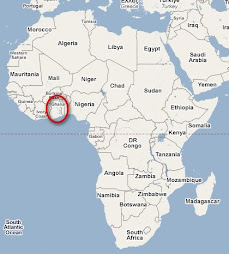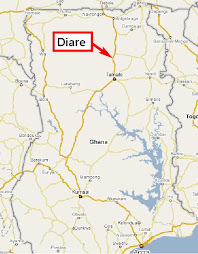As a Civil Engineering student in Canada, I have been learning how to design infrastructure based on Canadian building codes and standards. If you are designing a structure, you use the building code which has information on the strength properties and dimensions of standardized building materials. Then you place an order, the materials are inspected, and heavy equipment is used for the construction. On a construction site, all workers must wear steel toe boots and a hard hat and there is always someone in charge of quality control – making sure everything is carried out under the proper standards. To design the foundation, you use specialized equipment to take soil samples which are then sent into a lab to be thoroughly analyzed. I am leaving out many details, but I am just giving some context so that I can make a comparison.
At ITFC, I was fortunate enough to witness the construction of a few small dams that are being used for irrigation. Engineering in Ghana is a whole different story. There are no building codes, no labs to test soil samples, and no standardized building materials. I once went with one of my managers to pick up some steel re-bar. You basically point to a pile and say “that one”. When I looked at the steel I saw that it was covered in rust, which decreases its strength. In Ghana, you have to take what you can get. The aggregates for concrete are not the proper size or shape because the workers have to crush up the stones by hand. Never mind steel-toed boots and hardhats, construction workers here don’t even wear shoes. Another big issue is quality control. I once walked onto a site with the general manager at ITFC where they had just finished pouring the concrete for a dam, and we saw that there was almost no cement in the mixture. Most likely, the workers stole it so that they could sell it or use it for their homes. There is almost no construction equipment available. If you need to excavate, you hire a bunch of farmers and tell them to bring their hoes. These are just a few of the barriers I saw from the short amount of time I had in Ghana.


When attempting to implement a technology in a developing country, you can not simply take something that works well in Canada and apply it overseas. In my opinion, you need to invest time in a community to gain a better understanding of how things work and what might actually be useful to the people. I believe that the community should be heavily involved in the idea and implementation of the project in order for it to be successful. At EWB, we believe that we should focus on building the capacity (buzz word – sorry) of the communities and partner organizations we work with so that they have the skills and resources to implement their own projects. Many of our volunteers overseas are not engineers, and many of our projects have almost nothing to do with engineering. One thing that I can be sure of is that we are reaching out to the engineering community in Canada. I serve as an example; I probably would not have participated in this program had I not been attracted to the name “Engineers Without Borders”
The implementation of technology in developing countries has always been interesting to me and I would like to explore the idea further. While I was working with ITFC I kept my eyes open for any opportunities to become involved with the technical aspects of their work. As I mentioned earlier, the company has been building small dams (or weirs really). The wet season is only about half-way over and already some of the dams have failed due to seepage and erosion. Because I am in my final year of studies, I have to complete a technical paper where I can choose the topic. I have spoken with some of the McGill faculty as well as the general manager at ITFC and decided that I will write my paper on small-scale irrigation for farming and perform a case study on the company. ITFC will be constructing more dams in the future, so I can give them advice on how to build new dams as well as determine ways they can improve the existing ones.
And that’s not all… I have another idea which is a bit more far-fetched. I have spent some time with the General Manager, discussing a potential project where a hydro-electric dam would be constructed on the White Volta. There is a small waterfall along the river where the head should be high enough to power a turbine and generate electricity. The dam would impede the flow of water but not stop it completely. The idea is that the dam will force some of the water back upstream and into a canal. This canal would run eastward, up through the Janga area, and then back down through the Gushie area. This hydro-electric dam would provide electricity to communities in the northern region, and would create a clean water source that can be used for irrigation by both ITFC and subsistence farmers.

I am going to meet with members of the Civil Engineering faculty and see if it would be feasible for this hydro-electric dam be my final semester design project. In order to complete a degree at McGill, students are required to work in groups of three of four alongside professors and professional engineers and perform an actual design. In the past, many design projects have been derived from actual civil engineering jobs. If the faculty were to agree with this idea, I would be able to directly contribute my engineering skills to the development field, and I would be showing the Canadian engineering community how we can play a bigger part in development.




































